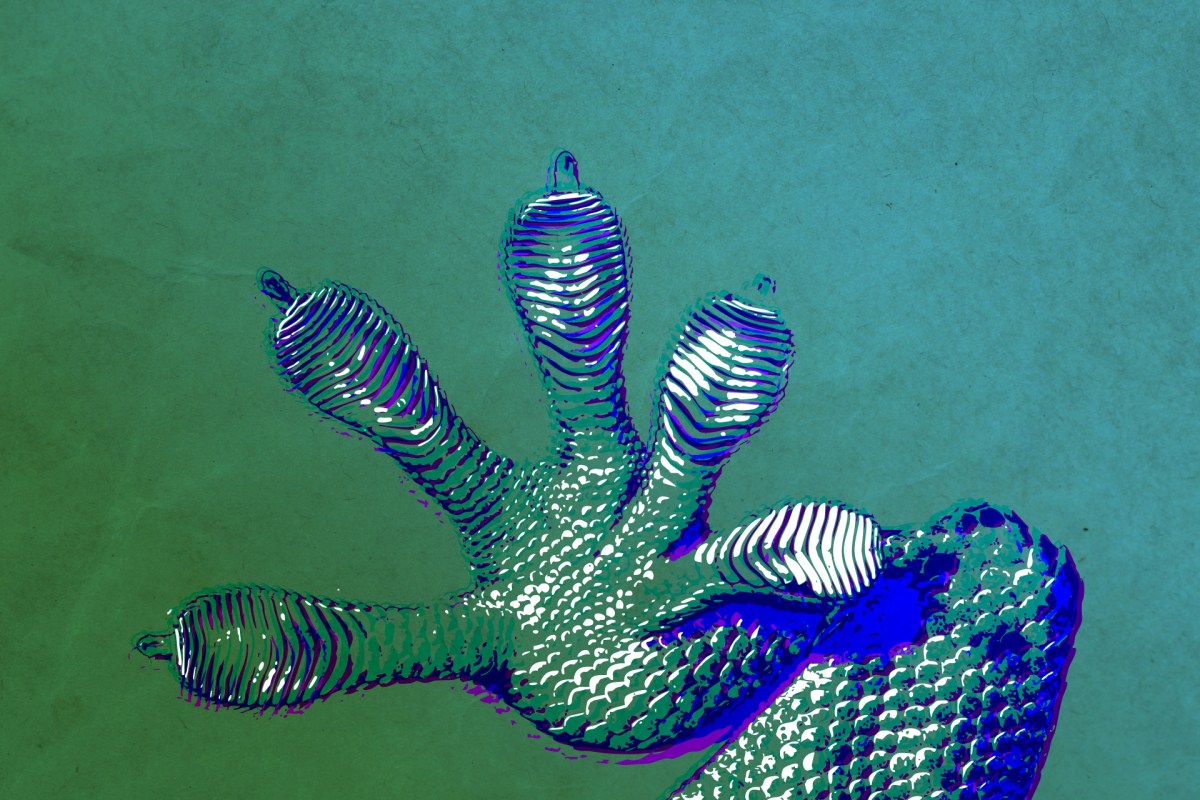It looks fake, or at least like a good illusion: There’s Gecko Materials founder Capella Kerst dangling a full wine bottle from her pinky finger, the only thing keeping it from smashing to pieces being the super-strong dry-adhesive her startup has brought to market. But it’s no trick. It’s the result of years of academic […]
© 2024 TechCrunch. All rights reserved. For personal use only.
It looks fake, or at least like a good illusion: There’s Gecko Materials founder Capella Kerst dangling a full wine bottle from her pinky finger, the only thing keeping it from smashing to pieces being the super-strong dry-adhesive her startup has brought to market.
But it’s no trick. It’s the result of years of academic research that Kerst built on by inventing a method to mass-manufacture the adhesive. Inspired by the way real-life gecko feet grip surfaces, you could think of it like a new Velcro — except it only needs one side, leaves no residue, and can detach as quickly as it attaches. It can do this at least 120,000 times and, as Kerst noted in a recent interview with TechCrunch, can stay attached for seconds, minutes, or even years.
Kerst has spent the last few years giving this magic trick-style demo any and everywhere: At VC happy hours, during pitch meetings, and on TikTok and Instagram Reels. And it works. Not just mechanically, but as a method of quickly captivating investors and customers. Gecko raised a $2 million seed round in 2021 in less than 36 hours, and boasts Ford, Pacific Gas & Electric, and even NASA as early customers.
Yes, before Kerst makes her pitch on the Startup Battlefield stage at TechCrunch Disrupt 2024, Gecko Materials’ adhesive has already been to space.
The adhesive is incredibly strong. One square-inch tile of it can hold 15 pounds, vertically, while six of them is enough to pull a car. It works by leveraging van der Waals forces, which involves interactions at the intermolecular level.
It can be complicated to understand, so Kerst likes to lean on what Gecko’s material is not.
“It’s not suction, it’s not excretion, it’s not tape, it’s not glue, it’s not micro-hooks,” Kerst explained. It doesn’t require an electrical charge of any kind. It’s also not based on suction, which is what some other companies that promise gecko-like adhesive tend to use, Kerst wryly noted. Suction-based methods create concentrations of force, she said, meaning force is applied unevenly, potentially causing fractures or leaving debris behind.
Really, she said, Gecko’s material is more like micro hairs that are 1/100th of the size of a hair on a person’s head. When applied to a smooth or semi-smooth surface, they pull down and “shear” to create “an extremely strong force.” Pull in the opposite direction at anything more than 20 degrees relative to the plane of that shear and it detaches in milliseconds.
This makes it possible to uniformly load the force and, just as importantly, uniformly disengage the force, which means it can be used for very delicate objects like quartz wafers, glass, solar panels, or even food items like eggs and rotten tomatoes.
So far that has meant it is a great material for robots or drones that do lots of picking and placing, which is one reason Gecko has found early success with manufacturers.
“We’re eliminating the traditional pitfalls of adhesives,” Kerst said.
The wine bottle demo is emblematic of how Kerst wants to approach mass-manufacturing Gecko’s adhesive. It’s simple, but impactful. The demo “gets people’s ideas flowing,” Kerst told TechCrunch. “We’re a public benefit corp., so we are for-profit, but I want to help people save energy, time, and money, and just bring back innovation in the hardware space.”
It’s such a tempting product to fiddle with that, in a recent interview with YouTube show The Pitch, she had a prospective investor ready to pony up $1,200 on the spot to take a piece home. (In part, funnily enough, so the investor could show it to some magician friends.)
Getting that cost down is a goal as Gecko scales production, Kerst admits. The current cost is roughly 10 times more than other common adhesive options like 3M’s command strips. But Gecko already has software-like gross profit margins of more than 80% on the material, and Kerst is quick to point out that 3M command strips can only really be used once.
Gecko already generated more than $700,000 in revenue in 2023, and Kerst said the company has a “clear path” with its current paying customers to do $75 million in annual recurring revenue in five years. It’s also in the process of raising another round of funding to scale operations.
“I’m really passionate about being able to make local manufacturing more sustainable and bring that around the world,” Kerst said. She also does not shy from the Velcro comparisons. “I do see a pathway in which Gecko Materials is like a household name, a worldwide name. Obviously, we’re already a space-wide name,” she smiled.

Leave a Reply